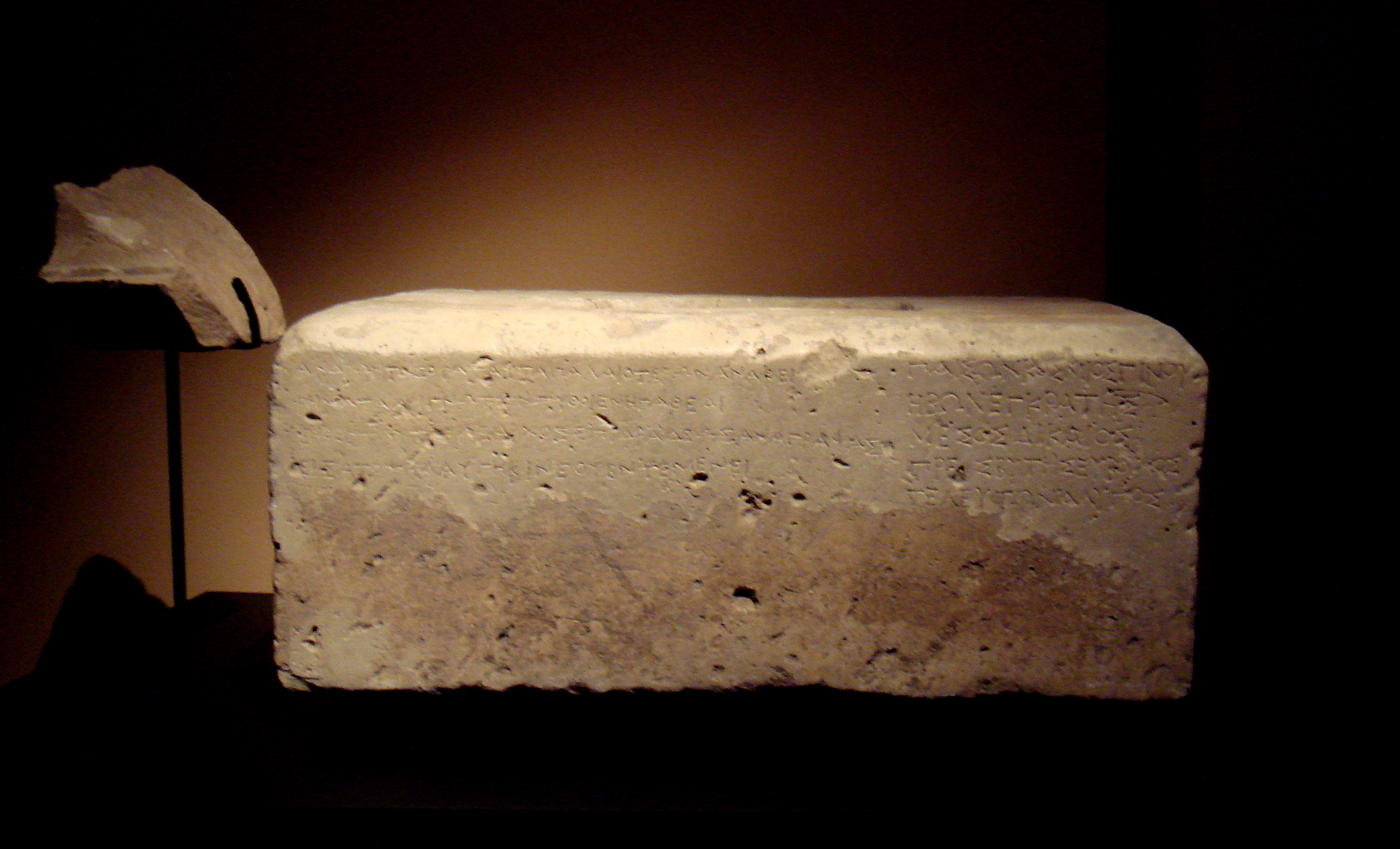Peripatetic Clearchus on:
[Wikipedia]
[Google]
[Amazon]
Clearchus of Soli ( el, Kλέαρχoς ὁ Σολεύς, ''Klearkhos ho Soleus'') was a Greek
 In the
In the
philosopher
A philosopher is a person who practices or investigates philosophy. The term ''philosopher'' comes from the grc, φιλόσοφος, , translit=philosophos, meaning 'lover of wisdom'. The coining of the term has been attributed to the Greek th ...
of the 4th–3rd century BCE, belonging to Aristotle's Peripatetic school. He was born in Soli in Cyprus.
He wrote extensively on eastern cultures, and is thought to have traveled to the Bactria
Bactria (; Bactrian: , ), or Bactriana, was an ancient region in Central Asia in Amu Darya's middle stream, stretching north of the Hindu Kush, west of the Pamirs and south of the Gissar range, covering the northern part of Afghanistan, southwe ...
n city of Ai-Khanoum (Alexandria on the Oxus) in modern Afghanistan.
Writings
Clearchus wrote extensively around 320 BCE on Oriental cultures, from Israel to Persia to India, and several fragments from him are known. His book "Of Education" (Greek: , ''Peri paideiās'') was cited byDiogenes Laërtius
Diogenes Laërtius ( ; grc-gre, Διογένης Λαέρτιος, ; ) was a biographer of the Ancient Greece, Greek philosophers. Nothing is definitively known about his life, but his surviving ''Lives and Opinions of Eminent Philosophers'' is a ...
.
Clearchus in particular expressed several theories on the connection between western and eastern religions. In "Of Education", he wrote that "the gymnosophists are descendants of the Magi".
In another text, Josephus the first-century Romano-Jewish scholar claimed that Clearchus has reported a dialogue with Aristotle, where the philosopher states that the Hebrews were descendants of the Indian philosophers:
His works included also:
* ' (Bioi); a work on the right way of life, in at least eight volumes
* A commentary on Plato's '' Timaeus''
* ' (Platōnos enkōmion); eulogy to Plato
* ' (Peri tōn en tē Platōnos Polīteiā mathēmatikōs eirēmenōn); on the mathematical subjects in Plato's Republic
A republic () is a "state in which power rests with the people or their representatives; specifically a state without a monarchy" and also a "government, or system of government, of such a state." Previously, especially in the 17th and 18th c ...
* ' (Gergithios); a treatise on flattery
* ' (Peri filiās); on friendship
* ' (Paroimiai); proverbs
* ' (Peri griphōn); on riddles
* ' (Erōtika); a probably historical collection of love-stories with some very odd questions on the subject
* ' (Peri graphōn); on paintings
* ' (Perigraphai); ? the reading in Athenaeus is doubtful (XIV 648f)
* ' (Peri narkēs); on the electric ray
* ' (Peri tōn enudrōn); on water-animals
* ' (Peri thīnōn); on sand-wastes
* ' (Peri skeletōn); an anatomical work
* ' (Peri upnou); on sleep (genuineness questionable)
There is some question as to whether the work on military tactics cited by Aelianus Tacticus should be ascribed to Clearchus of Soli or Clearchus of Heraclea Clearchus ( el, Kλέαρχoς, ''Klearkhos''; c. 401 BC – 353 BC; also spelled Cleärchus or Cleärch) was a citizen of Heraclea on the Euxine (Black Sea) who was recalled from exile by the oligarchy of that city to aid them in quelling the g ...
.
Travels
 In the
In the Bactria
Bactria (; Bactrian: , ), or Bactriana, was an ancient region in Central Asia in Amu Darya's middle stream, stretching north of the Hindu Kush, west of the Pamirs and south of the Gissar range, covering the northern part of Afghanistan, southwe ...
n city of Ai-Khanoum, near the border with India, Greek verses, brought to city by Clearchus from Delphi
Delphi (; ), in legend previously called Pytho (Πυθώ), in ancient times was a sacred precinct that served as the seat of Pythia, the major oracle who was consulted about important decisions throughout the ancient classical world. The oracle ...
, were dedicated to the founder of the city named Kineas. On a Herôon (funerary monument), identified in Greek as the tomb of Kineas (also described as the ''oikistes
The ''oikistes'' ( gr, οἰκιστής), often anglicized as oekist or oecist, was the individual chosen by an ancient Greek polis
''Polis'' (, ; grc-gre, πόλις, ), plural ''poleis'' (, , ), literally means "city" in Greek. In Ancien ...
'' (founder) of the Greek settlement) and dated to 300-250 BC, the inscription says: Delphic epigram in Ai-Khanoum (Wikisource in Greek)
The precepts were placed by a Greek named Clearchus, thought to be Clearchus of Soli, who had copied them from Delphi
Delphi (; ), in legend previously called Pytho (Πυθώ), in ancient times was a sacred precinct that served as the seat of Pythia, the major oracle who was consulted about important decisions throughout the ancient classical world. The oracle ...
:
Clearchus of Soli was a contemporary and compatriot of Stasanor (born in the same city of Soli, in Cyprus), who was a general of Alexander the Great and later satrap
A satrap () was a governor of the provinces of the ancient Median and Achaemenid Empires and in several of their successors, such as in the Sasanian Empire and the Hellenistic empires.
The satrap served as viceroy to the king, though with consid ...
of Bactria
Bactria (; Bactrian: , ), or Bactriana, was an ancient region in Central Asia in Amu Darya's middle stream, stretching north of the Hindu Kush, west of the Pamirs and south of the Gissar range, covering the northern part of Afghanistan, southwe ...
and Sogdiana.
Notes